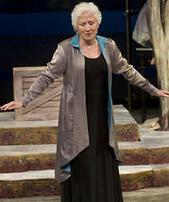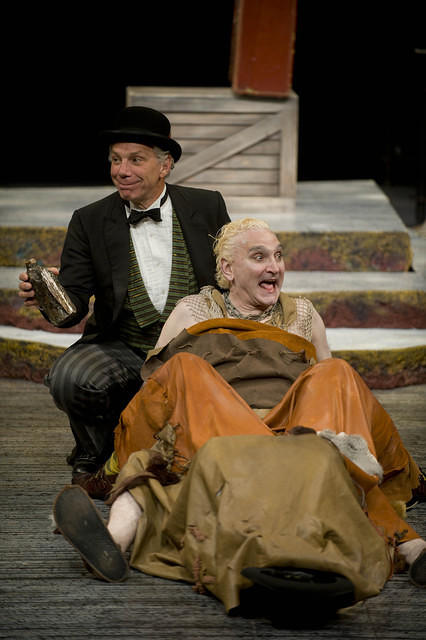SITE GUIDE
SEARCH
REVIEWS
REVIEW ARCHIVES
ADVERTISING AT CURTAINUP
FEATURES
NEWS
Etcetera and
Short Term Listings
LISTINGS
Broadway
Off-Broadway
NYC Restaurants
BOOKS and CDs
OTHER PLACES
Berkshires
London
California
New Jersey
DC
Philadelphia
Elsewhere
QUOTES
TKTS
PLAYWRIGHTS' ALBUMS
LETTERS TO EDITOR
FILM
LINKS
MISCELLANEOUS
Free Updates
Masthead
A CurtainUp Berkshire Review
The Tempest
|
O wonder!/ How many goodly creatures are there here!/ How beauteous mankind is!/ O brave new world/ That has such people in’t.— Miranda
|

Olympia Dukakis
(Photo credit: KennethSprague |
The sight that greeted me as I drove into the Shakespeare & Company grounds was impressive indeed. Though I had read the ads for their thirty-fifth anniversary season and heard glowing reports from friends about this cultural oasis nestled in the Berkshires, there’s nothing that compares with experiencing it first-hand. It is a breath-taking green landscape with the Tina Packer Theater recently renamed for the company's dynamic founder and longtime artistic director, built on the manicured edge of its sprawling 30-acre campus. Even before seeing the production, I was enchanted!
Tucking into my theater seat moments later, I began to study the set design and the stage’s general architecture. Sandra Goldmark’s minimalist stage set, which doubles for the tragic landscape of King Lear (the production playing in repertory with The Tempest and featuring a number of the same actors), is dominated by a gradated platform and towering tree imbedded at center stage, suggesting a hillock and the barky tree where Ariel was imprisoned by the witch Sycorax (Caliban’s mother) before Prospera set her free. A wooden crate serves as a makeshift throne for Prospera on this tropical island, with a few other crates plunked down at various places on stage. The set takes a surreal bent at the balcony level along the back wall. Goldmark has sculpted the partial outline of a shipwreck via riggings, rope, and planks. It has a haunting look, and it not-so-subtly points up that Prospera the Magus has plenty of rough magic at her command.
The theater’s traditional architecture—no surprise here—-is Elizabethan, complete with balcony tiers and audience seating on three sides of the stage. No matter where you sit in this theater you cannot miss the action.
You know the fable! But I will alert you that Shakespeare’s protagonist has been regendered and that the play takes place on a Mediterrean island in the 1940s: Prospera (Olympia Dukakis) has raised a storm with the help of the sprite Ariel (Kristin Wold) to revenge her enemies, including her villainous brother Antonio (James Read) who robbed her of the throne, the King of Naples (Thomas L. Rindge), and his brother Sebastian (David Joseph). The seamen struggle to survive as their ship goes down. They are spared from drowning, miraculously wash ashore on the island where Prospera and Miranda (Merritt Janson) have lived since their banishment 12 years ago.
Rhis is one of the few original plots that Shakespeare penned and it keenly observes the classical unities of time, place, and action (except for its opening shipwreck scene). It is almost as if Shakespeare was trying to even the dramatic score with his fellow playwrights in his late career, especially the university wits like Ben Jonson, who had often thumb-nosed the Bard for not adhering to the traditional forms of playwriting.
Beyond its literary excellence, this play is famously known as Shakespeare’s “farewell to the stage.” Written in 1611and performed before King James at Whitehall in November of that same year, it is the last piece that Shakespeare wrote alone. Yes, the Bard had a creative hand in Henry VIII (1612-13) and The Two Noble Kinsmen (1613-14), but they are now believed to be collaborative efforts with the young John Fletcher who was the up-and-comer in London’s playwriting circles in the early seventeenth century.
To returning to the Shakespeare & Company production, Dukakis is not the first woman to gender-bend the role of Prospero. In a program note, dramaturge Katharine Goodland gives the skinny on what actresses in recent years “have assumed Prospero’s staff.” She cites Vanessa Redgrave (Globe Theatre, 2000), Blair Brown (McCarter Theatre, 2003), and Helen Mirren (in the film adaptation, 2010). Of these three, I have had the great good luck of seeing Brown on stage and Mirren in the film adaptation.
In marked contrast to Brown and Mirren, who both portrayed Prospera as an austere patrician, Dukakis comes across as a grande dame who possesses the common touch. Dukakis, at 81, is not pulling out the stops here but she still has plenty of charismatic presence. Along with her personal magnetism, she is a wizard of facial expressiveness. Her raised eyebrow can speak volumes, and her lips tightening can send shock waves across the stage. She doesn’t deliver her iambic pentameters with consistent polish and some audience members in the back rows might have to strain forward in their seats to hear all her lines. No matter. She gets across the essence of a woman resolved to reclaim her “place” in a patriarchal society. Her Prospera refuses to be a victim, and ultimately shows her brother Antonio and his posse that she won’t be denied the throne of Milan.

Jonathan Epstein and Rocco Sisto
(Photo credit: KennethSprague |
Scott Killian’s music to delight and there are some striking visual moments: The masque is well-done with sprites playing Juno (Stephanie Hedges), Ceres (Jennifer Young), and Iris (Casey McShain). Equally effective is the scene when Prospera sends Ariel to gather fancy clothes to catch the vain villains Stephano, Trinculo, and Caliban, with her intent being to distract them from their assassination plot against her.
When the play gradually winds down Prospera gains the advantage and soon has everybody at her mercy. But no revenge play, this! Prospera's potent Epilogue trumps the evening with its rhyming couplet: “As you from crimes would pardoned be,/ Let your indulgence set me free!”
Heading back to New York the next day, I realized that that each Tempest brings its own rewards. The experience was enriched by the commitment of the many people involved.
|
The Tempest by William Shakespeare DIrector: Tony Simotes Cast: Thomas Brazzle (Francisco), Greg Boover(Sailor/Ensomble), Apollo Dukakis(Gonzalo), Timothy Douglas (Trinculo), Olympia Dukakis(Prospera), Jonathan Epstein(Stephano), Monica Giordano(Spirit), Stephanie Hedges(Juno Spirit), Merritt Janson(Mirando), David Joseph(Sebastian), Peter Macklin(Adrian), Casey McShain(Iris, Spirit), Sam Perry(Sailor/Ensemble), James Read(Antonio), Tom Rindge(Alonso), Rocco Sisto(Rocco Sisto), Ryan Winkles(Ferdinant), Kristin Wold(Ariel), and Jennifer Young(Ceres, Spirit). Costumes: Deborah Brothers Sets:: Sandra Goldmark Lighting: Matthew Adelson Composer/Sound designer: Scott Killian Fight Choreographer: Tony Simotes Voice/Text coaching: Elizabeth Ingram & Malcolm Ingram Dramaturg: Katharine Goodland Stage Manager: Diane Healy Tina Packer Playhouse, Lenox, MASS July 19 - August 19, 2012 Reviewed by Deirdre Donovan at 7/27 press preview |
|
REVIEW FEEDBACK Highlight one of the responses below and click "copy" or"CTRL+C"
Paste the highlighted text into the subject line (CTRL+ V): Feel free to add detailed comments in the body of the email. . .also the names and emails of any friends to whom you'd like us to forward a copy of this review. Visit Curtainup's Blog Annex For a feed to reviews and features as they are posted add http://curtainupnewlinks.blogspot.com to your reader Curtainup at Facebook . . . Curtainup at Twitter Subscribe to our FREE email updates: E-mail: esommer@curtainup.comesommer@curtainup.com put SUBSCRIBE CURTAINUP EMAIL UPDATE in the subject line and your full name and email address in the body of the message. If you can spare a minute, tell us how you came to CurtainUp and from what part of the country. |

Slings & Arrows- view 1st episode free
 Anything Goes Cast Recording
Anything Goes Cast RecordingOur review of the show
 Book of Mormon -CD
Book of Mormon -CDOur review of the show

